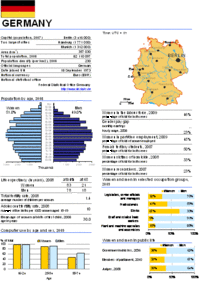
Back إحصائيات رسمية Arabic Amtliche Statistik German Estatistika ofizial Basque آمار رسمی Persian Statistique publique French Statystyka publiczna Polish Državna statistika Slovenian
This article is written like a review. (December 2022) |

Official statistics are statistics published by government agencies or other public bodies such as international organizations as a public good. They provide quantitative or qualitative information on all major areas of citizens' lives, such as economic and social development,[1] living conditions,[2] health,[3] education,[4] and the environment.[5]
During the 15th and 16th centuries, statistics were a method for counting and listing populations and State resources. The term statistics comes from the Neo-Latin statisticum collegium (council of state) and refers to science of the state.[6] According to the Organisation for Economic Co-operation and Development (OECD), official statistics are statistics disseminated by the national statistical system, excepting those that are explicitly not to be official".[7]
Governmental agencies at all levels, including municipal, county, and state administrations, may generate and disseminate official statistics. This broader possibility is accommodated by later definitions. For example:
Almost every country in the world has one or more government agencies (usually national institutes) that supply decision-makers and other users including the general public and the research community with a continuing flow of information (...). This bulk of data is usually called official statistics. Official statistics should be objective and easily accessible and produced on a continuing basis so that measurement of change is possible.[8]
Official statistics result from the collection and processing of data into statistical information by a government institution or international organization. They are then disseminated to help users develop their knowledge about a particular topic or geographical area, make comparisons between countries or understand changes over time. Official statistics make information on economic and social development accessible to the public, allowing the impact of government policies to be assessed, thus improving accountability.
- ^ United Nations. "Economic and development statistics" http://www.un.org/esa/progareas/stats.html Archived 2008-09-13 at the Wayback Machine
- ^ Eurostat-"Comparative EU-Statistics on Income and Living Conditions: Issues and Challenges" http://www.stat.fi/eusilc/index_en.html Archived 2009-08-21 at the Wayback Machine
- ^ World Health Organization. "World Health Statistics 2008". [1]
- ^ UNESCO. "Global Education Digest 2007". http://www.uis.unesco.org/ev.php?ID=7167_201&ID2=DO_TOPIC Archived 2008-06-16 at the Wayback Machine
- ^ United Nations Statistical Commission. "Environment statistics" http://unstats.un.org/unsd/statcom/stacom_archive/brochures/for%20web/Brochure%20-%20Environment.pdf Archived 2009-02-05 at the Wayback Machine
- ^ Ball, Philip (2004). Critical Mass. Farrar, Straus and Giroux. p. 53. ISBN 0-374-53041-6.
- ^ OECD. Online Glossary of Statistical Terms http://stats.oecd.org/glossary/index.htm Archived 2018-11-19 at the Wayback Machine
- ^ Biemer, Paul and Lyberg Lars (2003).Introduction to Survey Quality, Wiley. ISBN 978-0-471-19375-3
© MMXXIII Rich X Search. We shall prevail. All rights reserved. Rich X Search